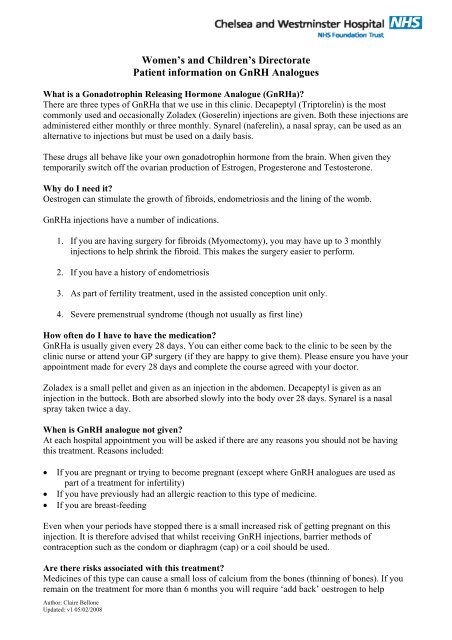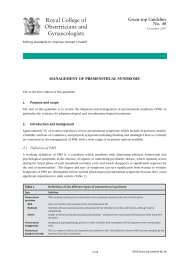What is GnRH Analogue - Nick Panay
What is GnRH Analogue - Nick Panay
What is GnRH Analogue - Nick Panay
- No tags were found...
Create successful ePaper yourself
Turn your PDF publications into a flip-book with our unique Google optimized e-Paper software.
Women’s and Children’s DirectoratePatient information on <strong>GnRH</strong> <strong>Analogue</strong>s<strong>What</strong> <strong>is</strong> a Gonadotrophin Releasing Hormone <strong>Analogue</strong> (<strong>GnRH</strong>a)?There are three types of <strong>GnRH</strong>a that we use in th<strong>is</strong> clinic. Decapeptyl (Triptorelin) <strong>is</strong> the mostcommonly used and occasionally Zoladex (Goserelin) injections are given. Both these injections areadmin<strong>is</strong>tered either monthly or three monthly. Synarel (naferelin), a nasal spray, can be used as analternative to injections but must be used on a daily bas<strong>is</strong>.These drugs all behave like your own gonadotrophin hormone from the brain. When given theytemporarily switch off the ovarian production of Estrogen, Progesterone and Testosterone.Why do I need it?Oestrogen can stimulate the growth of fibroids, endometrios<strong>is</strong> and the lining of the womb.<strong>GnRH</strong>a injections have a number of indications.1. If you are having surgery for fibroids (Myomectomy), you may have up to 3 monthlyinjections to help shrink the fibroid. Th<strong>is</strong> makes the surgery easier to perform.2. If you have a h<strong>is</strong>tory of endometrios<strong>is</strong>3. As part of fertility treatment, used in the ass<strong>is</strong>ted conception unit only.4. Severe premenstrual syndrome (though not usually as first line)How often do I have to have the medication?<strong>GnRH</strong>a <strong>is</strong> usually given every 28 days. You can either come back to the clinic to be seen by theclinic nurse or attend your GP surgery (if they are happy to give them). Please ensure you have yourappointment made for every 28 days and complete the course agreed with your doctor.Zoladex <strong>is</strong> a small pellet and given as an injection in the abdomen. Decapeptyl <strong>is</strong> given as aninjection in the buttock. Both are absorbed slowly into the body over 28 days. Synarel <strong>is</strong> a nasalspray taken twice a day.When <strong>is</strong> <strong>GnRH</strong> analogue not given?At each hospital appointment you will be asked if there are any reasons you should not be havingth<strong>is</strong> treatment. Reasons included:• If you are pregnant or trying to become pregnant (except where <strong>GnRH</strong> analogues are used aspart of a treatment for infertility)• If you have previously had an allergic reaction to th<strong>is</strong> type of medicine.• If you are breast-feedingEven when your periods have stopped there <strong>is</strong> a small increased r<strong>is</strong>k of getting pregnant on th<strong>is</strong>injection. It <strong>is</strong> therefore adv<strong>is</strong>ed that whilst receiving <strong>GnRH</strong> injections, barrier methods ofcontraception such as the condom or diaphragm (cap) or a coil should be used.Are there r<strong>is</strong>ks associated with th<strong>is</strong> treatment?Medicines of th<strong>is</strong> type can cause a small loss of calcium from the bones (thinning of bones). If youremain on the treatment for more than 6 months you will require ‘add back’ oestrogen to helpAuthor: Claire BelloneUpdated: v1 05/02/2008
maintain bone strength. You will also require a baseline bone mineral density tests to assess yourbone strength and possible yearly bone scans and treatment. Some recovery of th<strong>is</strong> loss can occurwhen treatment <strong>is</strong> stopped. If you are suffering from any d<strong>is</strong>ease which affects the strength of yourbones please make sure that your doctor <strong>is</strong> aware of th<strong>is</strong>. If you go into hospital, tell the medicalstaff that you are receiving <strong>GnRH</strong>a.<strong>What</strong> side effects may I experience?Some women may experience undesirable side effects. These may include hot flushes and sweating,reduced sex drive, headaches, mood changes including depression, vaginal dryness and change inbreast size. Rare undesirable effects include tingling in fingers or toes, skin rashes, rare allergicreactions, pain in the joints, changes in blood pressure, or thinning of bones.Occasionally some women may have an early menopause. Th<strong>is</strong> <strong>is</strong> called a Premature Menopause orPremature Ovarian Failure. It <strong>is</strong> not possible to predict th<strong>is</strong> when using the injections but whentreatment <strong>is</strong> stopped your periods may not start again. Th<strong>is</strong> has not been caused by the injections.Please d<strong>is</strong>cuss th<strong>is</strong> with your doctor or nurse if you are concerned.At the beginning of treatment, a worsening of breast symptoms e.g. tenderness may occur andvaginal bleeding may also occur. If it does, it <strong>is</strong> usually during the first month following treatment.If you have fibroids, a slight increase in symptoms such as pain may occur. These effects areusually short-lived and d<strong>is</strong>continue on continuation of treatment. If symptoms pers<strong>is</strong>t or you areuncomfortable, contact your doctor.In addition if you experience excessive nausea, vomiting or thirst, you should tell your doctor. Th<strong>is</strong>may indicate possible changes in the amount of calcium in your blood and your doctor may have todo certain blood tests. The injection may very rarely affect the pituitary gland in your brain causingsevere headaches, sickness or affect your v<strong>is</strong>ion. Please tell the nurse or doctor so th<strong>is</strong> may beinvestigated.When <strong>GnRH</strong>a <strong>is</strong> used as part of a treatment for infertility, the sex hormones, which are given to youlater, may very occasionally result in over stimulation of the ovaries. If you experience abdominalpain, abdominal swelling, nausea or vomiting after receiving these drugs for such treatment youshould let your doctor know immediately. Small cysts (swellings) on the ovaries can sometimesoccur following the use of <strong>GnRH</strong> and may cause pain for some women. They usually d<strong>is</strong>appearwithout treatment.Do not be alarmed by th<strong>is</strong> l<strong>is</strong>t of possible events. You may not experience any of them.If you get any other undesirable events or if you think your medicine <strong>is</strong> causing any problems, tellyour doctor or nurseStoring your medicineYou may be given a prescription and asked to get your medicine from the pharmacy and keep ituntil you see the doctor again. Keep it in its original package and don't break the seal. Do not storeit above 25°C and keep it in a safe place where children cannot see it or reach it.Useful contacts and addresses:• Gynaecology Outpatients Dept 020 8746 8882. (Monday to Thursday 9am-5pm, Friday 9am-1pm)• NHS Direct. www.nhsdirect.nhs.uk or 24hr helpline 0845 4647If you have any comments or concerns: PALS (Patient and Advice Lia<strong>is</strong>on Service) A service that providessupport, information and advice. L<strong>is</strong>tens to your concerns and queries. Located on the ground floor at Chelsea &Westminster Hospital. Opening times: 9am-6pm Monday to Friday. Alternatively, telephone 020 8846 6727Author: Claire BelloneUpdated: v1 05/02/2008









